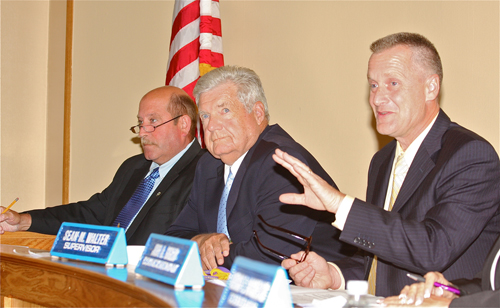Editorial: Compromise needed on next year’s budget

With details emerging on Riverhead Town’s 2015 fiscal situation — a grim one, to say the least — town political leaders will have to put their money where their mouths are as they work to close a $1.5 million budget gap.
The good news is that the 2015 deficit seems to have been reduced rather quickly from the $4.1 million hole originally estimated. The five Town Board members appear to agree on a few big-ticket items, such as offering retirement incentives, selling the Second Street firehouse and pulling funds from revenues the town earned by storing Hurricane Sandy-damaged cars on town land at the Enterprise Park at Calverton.
The not-so-good news is that much work remains to be done and as those harder decisions appear on the horizon, we worry that certain members of the board — namely, Supervisor Sean Walter and Councilwoman Jodi Giglio — are letting politics get in the way of good governance.
Mr. Walter and Ms. Giglio did find common ground when it came to the idea of a public hearing to consider piercing the state-mandated 2 percent tax cap — though they stood together on the wrong side of that issue. Maybe the public can’t handle a tax increase beyond the 2.7 percent the state allows, or maybe people would rather pay more in taxes than see services cut. Either way, residents should get a chance to weigh in.
But both Town Board members — along with Councilman George Gabrielsen — decided against finding out, each apparently for their own political reasons.
Mr. Walter and Mr. Gabrielsen both appear sold on trying to move forward with a “standby letter of credit,” aka a bridge loan. Meanwhile, Ms. Giglio points to already being in touch with voters in dismissing the tax cap hearing. Any steadfast resistance to raising taxes beyond the arbitrary number state lawmakers mandated should be questioned, especially during a fiscal crisis. Borrowing against anticipated revenues could lead to even larger tax hikes down the road, should those revenues not come in.
The most reasonable move at this point is for the board to think more pragmatically and expand its options — namely, by holding a public hearing on piercing the tax cap — and throughout the budget process, whittle down their best choices (a combination of raising taxes and making cuts) to a final product that benefits the town to the greatest extent possible. If the public soundly rejects piercing the cap, at least the board will have done its due diligence by gathering feedback on the record.
The supervisor has refused a middle ground in negotiations. He’s threatened “draconian” cuts should his plan to win a multi-million dollar letter of credit fail. That outcome benefits few — other than Ms. Giglio, who stands to benefit politically, should she make a future run for supervisor. While politics are bound to enter into any discussion during budget season, perhaps the most admirable of all political maneuvers should be remembered this time around: compromise.
If more compromise had happened in the past, perhaps we wouldn’t be in this mess.








